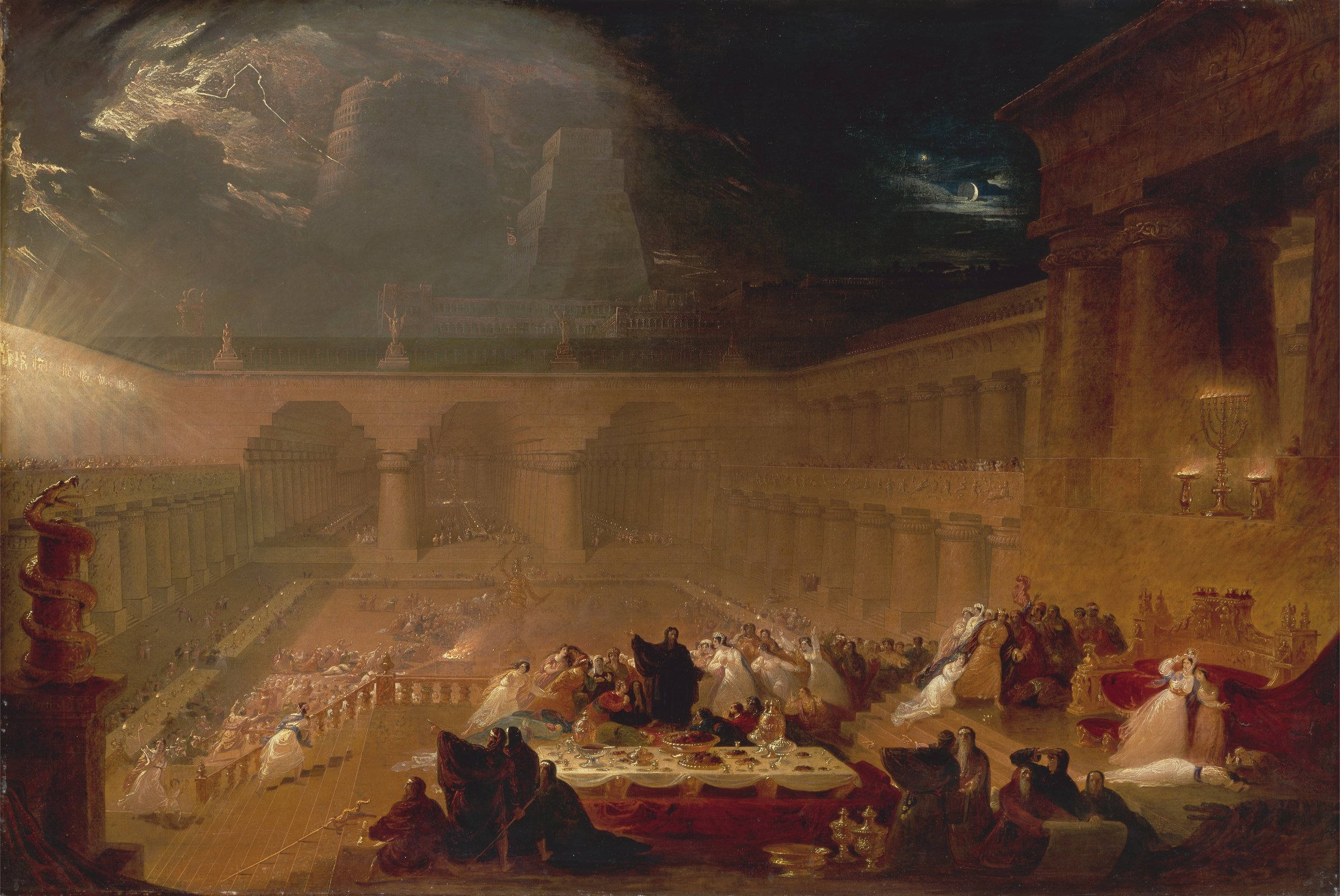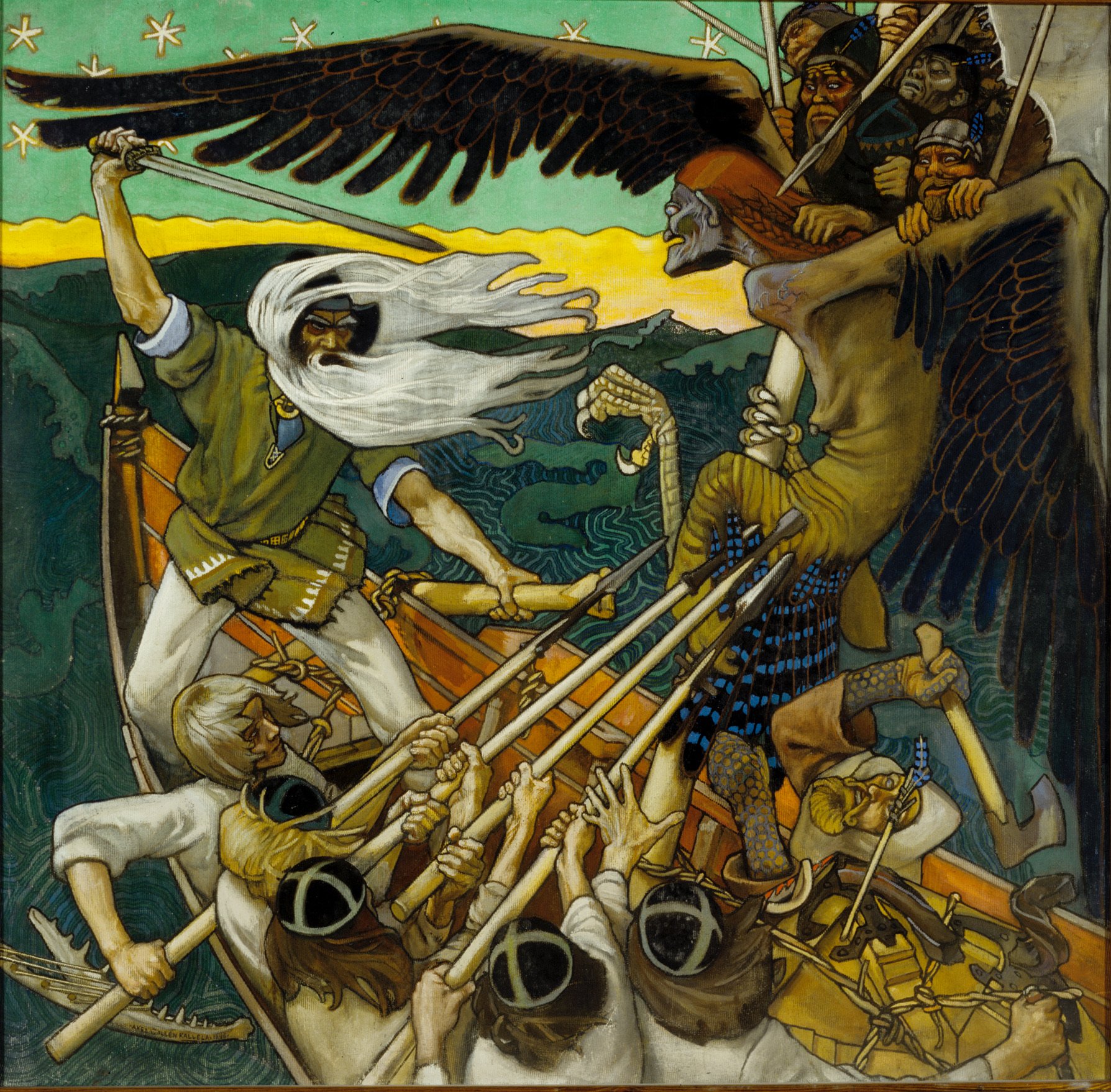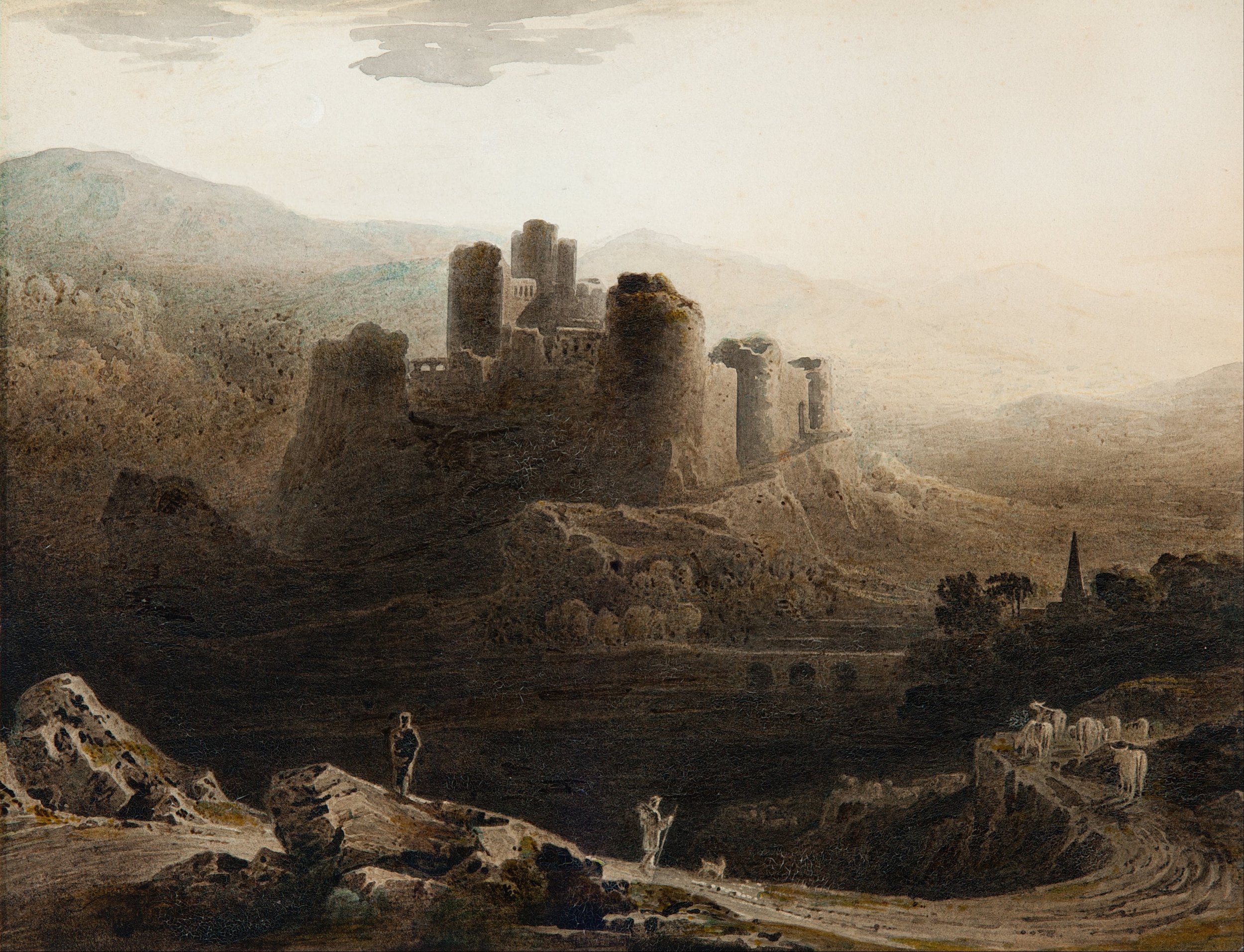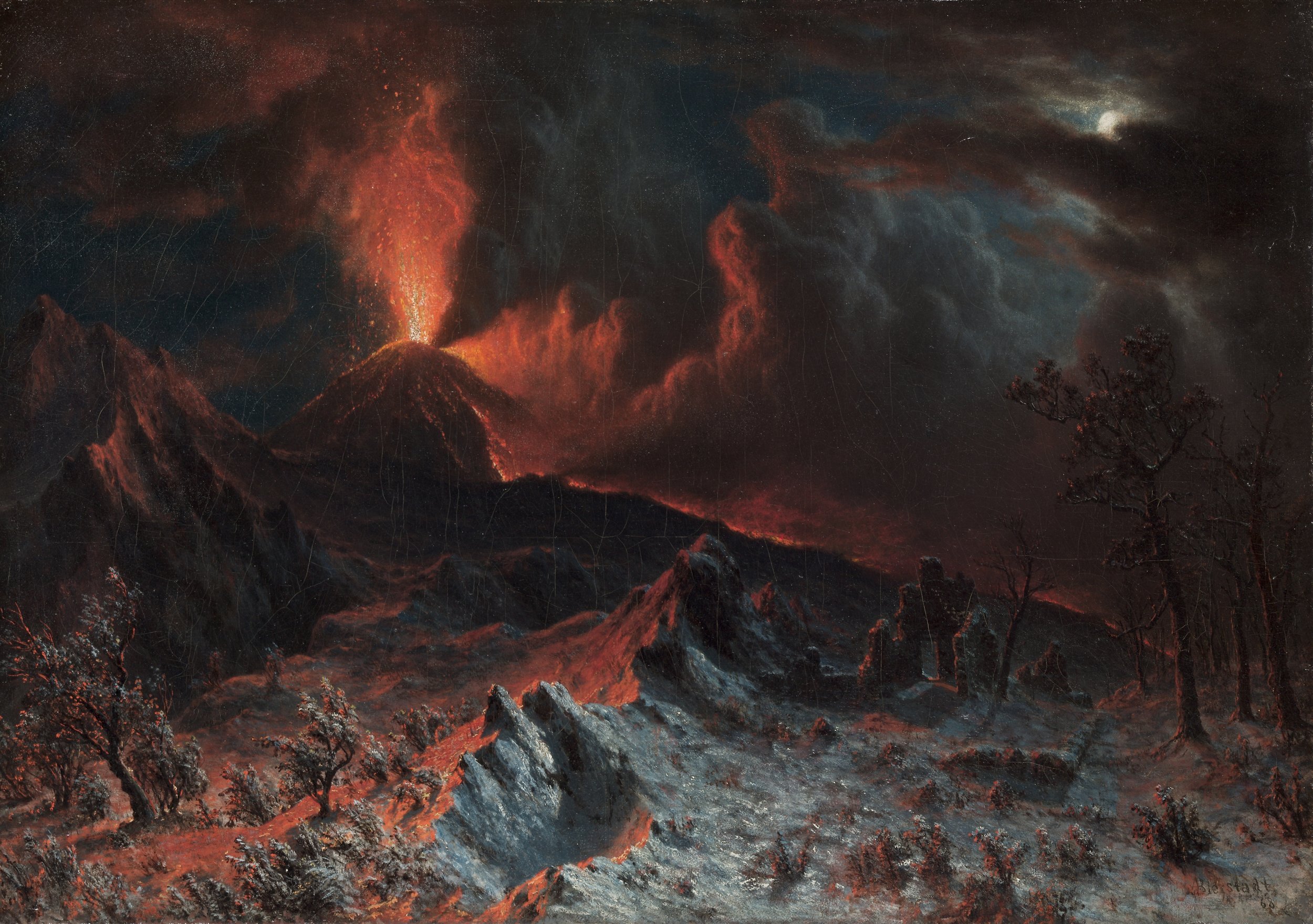In the Presence of Mine Enemies

In the Presence of Mine Enemies
Paul J. Pastor
On Holy Enmity and the Life of Beauty
Thou preparest a table before me in the presence of mine enemies.
— Psalm 23:5, KJV
Charity itself is full of war.
— Charles P.guy
I. A brief family anecdote of war.
My grandfather Paul, whom his grandchildren and great-grandchildren would one day affectionately call Gum, was the youngest of three children, born in 1925 in Canton, Ohio, to Pásztor Janos and Pásztorne Sitka Gizella, new immigrants from Hungary.
Paul was 16 years old when America entered the Second World War in 1941. When he was 18, he was drafted into the war in Europe and assigned as a private to a specialized rifle squad, mounted on “half-tracks,” as a point man for General Patton’s armor. His older brother John was 25—an officer, he went in on Omaha Beach, at the very center of the D-Day invasion of Normandy.
From the Normandy beachhead, John’s unit moved deeper into France before encountering a particularly well-planned German ambush in a particularly cursed rural hedgerow. Caught in the fire of heavy machine guns, small arms, a tank, and mortars, John left the momentary safety of the ditch, pulled a bazooka off a dead man, incapacitated the Panzer blocking their exit route with a well-placed shot, and was promptly shot and torn by shrapnel from the explosion of a nearby shell. Being a Pastor, he survived.
For his bravery in that single action, Uncle Johnny was awarded a promotion, two Purple Hearts, and the French Legion of Honor. He went home, where his barrel-chested body had a long recovery. For the remainder of his life, flecks of German steel would work their way out of his back while he slept. In the sunny light of early morning, his wife, Cozette, would pick them off the sheets and plink them into their trash can in Burbank, California. He had seen, if my memory is correct, only about 20 days of combat.
My grandfather Paul was assigned to General Patton’s Sixth Armored Division (the “Super Sixth”). He would serve in all of Patton’s five major campaigns, including the Battle of the Bulge. His were the first Allied boots into village after village held and hotly defended by the Germans. Casualties to his unit were enormous. He was hardened for many months by extreme conditions of stress, against an organized and determined enemy with a defender’s considerable advantage. He refused multiple promotions, having had time to notice the relative rate at which officers tended to die. He fought a very different war than that of his brother. It was long. It was exhausting. It made him quiet.
He could not then have known, as the European summer reddened to autumn and went corpse-blue with winter, that he would survive. Many decades later, he would tell me, one of the four men in our family named after him, that he had fully expected to die, and that all the rest of his life that followed he considered to be “extra,” a sheer gift.
He could not have known then, his thumbnail bruised blue by the bolt of his Garand, that he would marry his high school sweetheart, Irene, who would become my feisty, dark-eyed grandmother. Nor that he would graduate from college, earn a master’s degree, and complete his PhD. He could not have known the respected teaching career, nor the children, nor the grandchildren, nor the great-grandchildren, who would all, always, speak of him with reverence and affection, like one speaks of a chieftain or a wise man.
II. An unsettling aside.
I will venture that I know something about you. Perhaps things are going very well for you, or perhaps they are going very poorly, but in either case, I expect that you may be “losing heart.” What a cliché that phrase can be in the wrong mouth! But I mean it in the deepest sense of the term—you are becoming discouraged. The cœur (French for “heart”) of your courage draining away.
Perhaps, in spite of your belief, in spite of your best efforts, there is a sense of meaninglessness washing at your roots like the waves lap at a tree beside a swamp. It comes from everywhere and from nowhere, it seems. There is a wrongness in the world, difficult to name, and it is growing.
Only you know where the contours of this discouragement fall in your own life, but are they not there? It is in the fabric of our times. It drifts down to us with the changing of the years. You think it is politics, but politics are only the skin of the thing. So it is with culture, watching people on every side of you make fools of themselves because of fear, or ignorance, or one of the fashionable follies of our day. You would even chalk it to “human nature,” but it feels neither natural nor human. Perhaps, remembering some old preacher, you might blame it on a “fallen world,” but it does not feel that it is quite in the world at all.
Whatever it is, you feel it nosing itself against your heart.
III. The culture of Pretend.
Contemporary life in the developed world is characterized nearly everywhere by the quality of Pretend.
Our politics, business practices, relationships, social media feeds, and more are all defined by pretense—having the appearance of depth, competence, quality, or beauty, but the actuality of shallowness, incompetence, cheapness, and the tawdry or ugly. Pretending (which is not Imagination) has infected nearly every aspect of our lives.
This is not uniquely an American phenomenon, but America has perfected it through the irresponsibly used power of stories. I am not only referring to the stories that we think are stories (novels, blockbuster films), but also to things we do not automatically recognize as such. Consider advertising, for example—which uses the tools of story (plot, character, setting) to influence you in favor of a product, perhaps, or away from the other party’s political candidate. Or consider the carefully curated algorithms which tunnel through all of your digital life, working sleeplessly to understand your tracks in order to craft the story of you—your demographic, your interests, the likely trajectory of your short- and long-term life—in the hope of delivering just the right thing at just the right time to get you to ______ (buy, vote, share). Your life narrative is being used to shape the future of that narrative, becoming a trajectory aimed at money. Like the devil on your shoulder in old Looney Tunes cartoons, something is always whispering in your ear.
This culture of Pretend exists because contemporary life has become exceptionally insulated from reality. Never before in human history has such a small percentage of people had to deal with the beautiful and horrid essentials of human life—directly touching birth, illness, death, food production, war, peacemaking. There are now mercenaries to serve in every human struggle (usually on the other side of a screen), from buying our groceries to burying our dead. When the Real intrudes (and it always must intrude), there are experts to help control it or minimize its inconveniences to the majority of the population.
Polite society goes to great lengths to pretend away its enemies. Conflict, like other inconveniences, is outsourced for someone else to handle: the police, the lawyers, the military, a drone operator sitting in an air-conditioned office park while killing people in a foreign war zone. Enmity, as most of us experience it, is often either performative or superficial.
But what do we lose when we lose our enemies? In fact, to be a person without enemies would be a pitiable state. Would it not mean that one stood for nothing, or that one was nothing? Pasta may be free from enemies, I suppose. Who could hate a lump of warm, damp noodles? You might prefer something else, but hatred is the wrong category. A person, however peaceable, cannot be free of enemies, not without being of about the same spiritual depth as pasta. Jesus, after all, did not tell us either to ignore our enemies or to destroy them. He said to love them.
And how can you love your enemies if you have none?
IV. Of the holy enmity between the Children of Life and the Children of Wrong.
The central story of the entirety of the Christian Scriptures is of enmity. This conflict is between the offspring of Eve and the offspring of the Snake. The symbolism is clear here—Eve’s name is directly related to the Hebrew word for “life” and breathing; the name of the Snake (נָחָשׁ, or nāḥāš) carries a sense of being crooked, wrong, or twisted. Serpentine. This enmity, symbolically, is between Life and the Children of Life, and the Children of Wrong.
By Wrong, I do not mean an arbitrary moral wrong. At least not at first. I mean a Wrong that is infinitely more basic and more horrible than what we commonly think of as sin. The Snake’s twistedness was not about breaking a rule. It was about erasing Rule. It was not a temptation to disobey God. It was about trying to pretend into existence a world without Obedience or without a Real God at all.
This is the Wrong of our true and only original Enemy. It is a Wrong that would, if it could, un-nature every bit of nature and un-good every speck of the “very good.” It is a Wrong so total and sad and infantile and absolutely pointless that it would rejoice to make the bedrock soft, and all the water hard as flint, to make fire cold, and cause the wind to clot and fall to the ground in useless gobs. It is a Wrong that would make light dark, just for the hell of it, and which would turn every book to gibberish, and defecate on every sacred image. It is a Wrong that would make the fathers and mothers abandon their children and embitter children against their parents, that would make male nothing and female nothing, and turn every child into a self-important, lascivious adult and make the adults babble and tantrum like brats. A Wrong that would empty every pleasure of all joy and every life of all love.
This is the cosmic war that forms the black-and-scarlet backdrop to every human life. It is the one holy enmity. It is good to have the Wrong as enemy, to hate it with all your being. This is what love looks like when it meets what would undo it. This is why, in the Psalms, we ought to rejoice when we are told that the Messiah will break the raging nations with the Creator’s rod of iron, and why we ought to cheer with St. Paul when he tells us that Christ, through his resurrection, has led all the fallen Powers in triumphant procession, like a conqueror. It is why we should be out of our seats and shouting when the “great dragon” seen by St. John—who tried to swallow the Woman Clothed with the Sun—is cast down forever into the sea and the great pit. We are at war, and every soul you have ever met is a piece in that great game, becoming, one day at a time, either more a Child of Life or more a Child of Wrong. It is an honor to have such enemies. It is an honor to be such an enemy. It means that we are who we have been told we are.
At this point, you may be thinking I am going to make this political. You may think I am now ready to tell you which category of person you now have permission to hate, and who I would like you to vote against, or despise, or fight. But I will not do any of that. You may hate no one except Hatred itself. You may kill no one but Killing. Our weapons are not of this world, and our trust is not in princes nor their chariots.
IV. Danger! Danger!
There are four typical human responses to danger. Freeze, flight, fawn, or fight.
To freeze is to lock up. You do nothing. You just stand there. Bang. This is the deer in the headlights. This is the response of those who, unprepared for the confusion and adrenaline and surreality of true danger, just stop. It is the worst possible response.
Slightly better, from the perspective of basic survival, is flight. This, of course, is getting yourself the hell out of there. This is not usually a permanent fix, but it buys you some time, I guess.
Fawning is the most pathetic option. One tries to ingratiate oneself with the danger. One flatters the bully or licks the hand that holds the billy club. One offers the bully little treats, and laughs at all the bully’s jokes, and tells the bully how glad you are that he’s your friend as he’s shaking out your wallet and cussing you.
Then, of course, there is the option to fight. Here is what is glorified in all the big American stories. This fighting does not always mean resorting to outright violence, but, of course, violence is always on the table. Once begun, this will never end. Like flight, fighting may buy you some time. Perhaps it will buy you a few generations of time, and sometimes this must reluctantly be done. But it will never be permanent. It will always halfway serve the Wrong even as it pushes it back. It will always cost part of you. Even the best soldiers will carry within them some “spot in France.”
With a little thought, I am sure that you can think of examples of Christian responses to culture that would fall under each of these categories—perhaps even people or public figures who might typify each one. So which of the four will it be?
Well, there is a fifth option. To feast.
V. Of that blessed table which is prepared for us.
The twenty-third Psalm is a song of trust. It is perhaps the most beautifully articulated statement of confidence in God other than Job’s (“Though he slay me, yet will I trust him”). The psalmist poetically paints God as a shepherd—a good shepherd—who, the careful reader will note, is not leading his sheep away from danger. He is leading the flock through it. Our path for grazing, for some reason we cannot fathom, leads “through the valley of the shadow of death.” When the table is laid for the psalmist, it is not among friends, but in the presence of enemies.
This is a way of saying that God leads us in the Real world. This is not an insulated Pretend. Yes, the pastures are green, and the waters are fresh and full of peace. Nonetheless, death and darkness surround. Through them, God leads us to the table he has prepared and to the feast laid upon it.
What does it mean to feast? More than just eating, a feast holds the dimensions of the sacred.
At the core of Christian tradition sits the table. Only the pool of baptism is as indispensable. The table becomes an altar. In the Anglican tradition, which has become my own, we speak St. Paul’s words from 1 Corinthians 5:8 at the culmination of the Eucharistic preparation when we celebrate the sacrifice of Jesus: Therefore, let us keep the feast.
But what is the feast? It is certainly our provision, our “daily bread.” And without question, it is the Eucharist, a sign and sacrament of Christ’s presence among his people. But the true dimensions of the feast prepared for us are even larger than they first appear. What is the table that God spreads for us in the presence of our enemies? It is as large as the world and limited only by our ability to receive it.
The Greek word from which we draw Eucharist is well translated as “Great Thanksgiving.” From the Presence of Jesus, Host at the Table of Life, the entire creation is being caught up and changed—becoming that endless and holy feast for which it is our joy and duty to give eternal thanks.
VI. The whole world, turned to table and to weapon.
To feast means to partake with joy, to celebrate abundance. Not every large meal is a feast. In fact, there are ways to feast without eating a thing. I have feasted richly in New York’s Met museum, have feasted to the point of sobs as the Oregon Symphony presented the music of Vaughn Williams. I feast upon the roses and lilacs in the spring. Each morning I am able, I feast as I rise at dawn and walk a mile to a nearby creek to plunge into a cold basalt pool, my “Pool of Wonders.” The trout rise, and the American Dipper birds dive around me, and I wash myself like Naaman of whatever leprosy has clung to me, and it is like eating.
As the whole world has been sanctified as an altar for Christ’s gift, so the whole world has become a table. And how it has been prepared! Witness the continents, spread like a cloth, draped with sand and snow, rising stark and blue to the boreal seas of ice, relaxing toward the luxury of the lush equator. Apples and pineapples, the brittle butterscotch scent of ponderosas, the shaggy mane of palms, the birds, the iridescent beetles, the bugling elk who tramp the chilly marshes. The voice of neon frogs who chorus in hot jungles, the clack of stone in the high Cascades as an aging marmot stumbles. Every fish. Every monstrous wonder of the deep, which science has not yet even discovered. The table holds the plasma breath of nebulae and of your own lungs with equal affection; the table is laid with all, every kind bearing fruit after its kind, each thing learning to speak its own name before God.
And to this table we come. This, through no virtue of our own. We come as children, receiving gifts so large we cannot see the end of them. And we eat, and play, and dance, and peck our runes in stone, and graffiti our secret names on freeway walls, and birth out laughing babies and play peekaboo, and tell one another why the tortoise has his shell, and what the wind is singing in the storm. We compose symphonies and crank tunes upon the hurdy-gurdy, and stomp in clogs, and fling ourselves off pommel horses in clouds of dusty chalk, and blast clay pigeons from the sky, and live.
And because it is all done in the presence of our enemies, it is all fighting. In all of it, most powerful when it is most unconscious, we, as Children of Life, fight the Children of Wrong. Every joy a spear against the dark, every love a shield, every thank you holding in itself more of reality than the massed deaths of all of history. This is what it means for the Creator to spite his enemies.
Which is why I must convince you to believe me. You must take heart, must resist the Wrong that presses you, no matter the form it takes. Your life, your life is part of this. You are at the table before your one true Enemy. Delight is incendiary. Beauty is a weapon. Not a weapon as the world would fashion it, nor as our baser instincts of hatred or vengeance would determine, but the only kind of weapon that can touch the Wrong. Against the unmaker, making. Against chaos, order. Against decomposition, form. Against confusion, clarity. Against the cramped and shrunken, magnitude and right proportion. Against the cheap, the sublime. Against death, eternal life.
For as it is written,
We wrestle not against flesh and blood, but against principalities, against powers, against the rulers of the darkness of this world, against spiritual wickedness in high places. (Eph. 6:12, KJV)
And as it says in another place,
Out of the mouth of babes and sucklings hast thou ordained strength because of thine enemies, that thou mightest still the enemy and the avenger. (Ps. 8:2)
Understand this and tremble; no true joy in your entire life was small. No love that you have ever loved was wasted. The lost moments, the beauties you could barely grasp, were each a blade forged in heaven. You cannot see your dimensions in this war. You cannot see your importance. If you could, it would unhinge you.
The Christian writer and artist is participating in the work of beauty under conditions of spiritual war. This is not a war of a quick invasion or single drastic acts of heroism. Rather, it is a war of a similar kind to that which my beloved grandfather fought, though I blush to make the comparison. A long war. A war that makes one quiet. But in this war, it is the childlike who lead the way to battle; it is the poets who strike. This is not mere foolishness or religious fluff. It is, in the clean logic of heaven, the only way to fight our enemy.
VII. Pawns and bean patches.
Once, while walking beside Gum toward a small diner in a stand of trees near Vernonia, Oregon, when I was a teenager, some angle of the light hit wrong. His arm instinctively shot out (still extremely strong), and he shoved me forcibly back and down behind him, out of what would have been the line of fire. “I’m sorry,” he said gently as he pulled me up a second later. “It reminds me of a spot in France.”
We carry our wars with us, no matter how well-fought or how well-laid the table. To discard the Pretend and to live is a work of difficulty, danger, and discouragement. Of course, you feel this in your own way. It means that you are fighting.
I work with writers, which means I often work with the discouraged. All true art contains an element of loneliness, but creative writing makes a craft of it. So it is natural to lose heart, to wonder if what you are doing is making any sort of difference at all. Is anyone reading? How can words, from people like ourselves, really do anything?
In chess, the pawn is the most easily discarded piece. There are so many of them, after all, and they can’t do much. Their movement is constrained; they attack awkwardly. It is for the knights and bishops to make grand forays, to inflict losses. I am not much of a chess player, but I have lost the game enough to tell you that this is not the pawns’ whole story. Sure, they’re slow and unimpressive. Alone, they are extremely vulnerable. But in a diagonal line, they form one of the strongest shapes in the entire game. They hold their ground. Like Shammah, son of Agee the Hararite (2 Sam. 23:11), who fought in a bean patch as his nation fled around him. He held that bean patch so well, that stupid plot of lentils, that the battle turned, and we still say his name thousands of years later in a language that was not yet born when he lived. We are holding ground. What pawn could see their true importance in the game? And yet the whole game may well hinge on one pawn.
And this is where I must turn to you, dear friend. For though I do not know you, I know that you have a part to play in this war. I know that you are made for goodness, truth, and beauty, made to “dwell in the house of the Lord forever.” I know there has been prepared for you a table in the presence of our enemies. I know that it requires considerable faith to rest at that table. To trust the shepherd with the rod of iron, who seems so slow to strike the wicked that are seeking whom they may devour. I know that it is difficult, almost beyond description, to participate in the work of beauty, and to resist the temptation to strike the various puppets that the old Snake bobs to distract us.
I know that you likely look about you, at whatever bean patch you are standing in, and you may be discouraged. You may see a cheap and unimpressive pawn when you look in the mirror. But no one else stands on your square. You do not know what pieces fall if you are taken. So hold the bean patch, friend. Strengthen the weak hands. Make firm the feeble knees. Be strong. Do not be afraid. For our God has set for us a table. In this—in us—he is crushing the head of all Wrong.
So let us keep the feast.
Paul J. Pastor
Author & Editor
Paul is a Contributing Editor for Ekstasis & Executive Editor for Nelson Books, an essayist, critic, author of the forthcoming book The Locust Years and Other Poems.
Painting by John Martin




